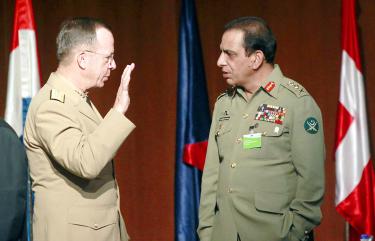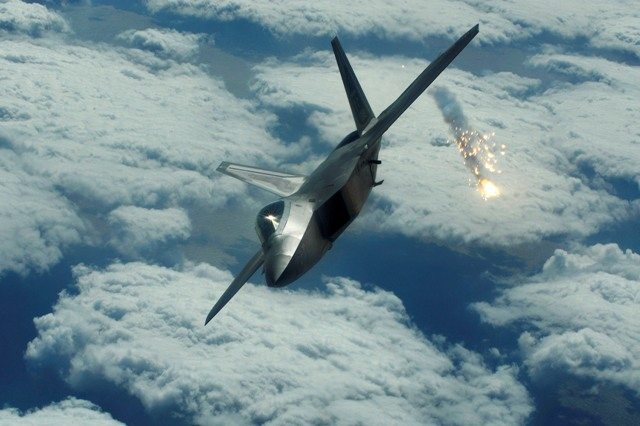The top US and Pakistani military leaders met in Spain to discuss ways to shore up strained ties after a US raid that killed Al-Qaeda leader Osama bin Laden and a spike in violence in Afghanistan, a Pentagon spokesman said.
Joint Chiefs of Staff Chairman Mike Mullen and his Pakistani counterpart General Ashfaq Kayani sat down for more than two hours of talks late Friday on the sidelines of a NATO conference in Seville, Mullen’s spokesman Captain John Kirby told AFP Saturday.
“They agreed that the relationship between our two countries remained vital to the region and that both sides had taken positive steps to improve that relationship over the past few months,” Kirby said.
“They also discussed the state of military-to-military cooperation and pledged to continue to find ways to make it better.”
It was the first meeting between the pair since the May 2 nighttime military raid in which US Navy Seals, without first notifying Islamabad, killed the Al-Qaeda leader in the compound in Abbottabad where he had been hiding.
As relations worsened in the aftermath of the raid, Washington announced that it could cut some of the $2.7 billion in military aid it sends to Pakistan.
Islamabad, for its part, ordered as many as 200 US military trainers out of the country in the aftermath of the operation.
US Defense Secretary Leon Panetta has expressed frustration that Islamabad has so far failed to crack down on Haqqani network militants that Washington suspects attacked the US embassy and NATO headquarters in Kabul on September 13-14.
The raid was launched by militants firing rocket-propelled grenades at the heavily fortified embassy. At least a half dozen rocket-propelled grenades landed inside the compound, killing 15 people dead.
US ambassador to Islamabad Cameron Munter said Saturday that there was evidence linking the Pakistani government with the Taliban-allied Haqqani network of militants blamed for the attack.
“There is evidence linking the Haqqani network to the Pakistan government. This is something that must stop,” Munter told state-run Radio Pakistan.
Citing unnamed Afghan officials, The Wall Street Journal reported Saturday that mobile phones found on the slain attackers after the raid indicate they were in contact with people from “outside Afghanistan.”
The possibility that Pakistan’s powerful Inter-Services Intelligence agency might have been involved in the raid was considered within hours of the attack when President Barack Obama’s National Security Council met Wednesday to discuss it, The Journal said.
According to the paper, a senior US defense official said there was currently no “actionable intelligence” linking Pakistan’s spy service to the attack.
“But we’re looking for it — closely,” the official was quoted in the report as saying.
During his meeting with his Pakistani counterpart, Mullen expressed “deep concerns about the increasing — and increasingly brazen — activities of the Haqqani network and restated his strong desire to see the Pakistani military take action against them and their safe havens in North Waziristan,” said Kirby.
While relations are frayed, Pakistan is seen as key for US military operations in Afghanistan, where the United States is to trying to beat down a resilient Taliban insurgency.
The United States uses unmanned surveillance aircraft in its war against the Taliban in Afghanistan to monitor militants in Pakistan, from where Al-Qaeda and Taliban-linked fighters launch attacks in Afghanistan.
It also uses Predator armed drones to launch missile attacks aimed at militants in Pakistan’s unstable northwestern border areas.
One such unmanned aircraft crashed in Pakistan’s lawless northwestern tribal district on Sunday apperently due to a technical problem.











